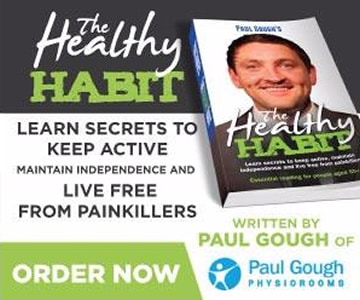One of the most stereotypical images of grassroots sport is the sight of the slightly over weight trainer wearing the padded jacket, carrying the bucket and sponge. Every team should have one and it seems that no matter what injury happens on the pitch, the sponge is the magical answer.
(Get sports injury tips when you look here: www.paulgoughphysio.com/sports-injuries)
When people found out that I was a physio working in professional football, the first question I would guaranteed to be asked is about some ailment or other that that person has. But the second and almost inevitable question after I’d diagnosed their problem, would be about the magic sponge and what makes it so special.
Truth is there isn’t really any magic too it.
The cold water often does little other than for a very limited period of time reduce the blood supply to the injured area to prevent swelling.
It was probably invented to buy players a bit of time, a way to almost justify spending a few extra seconds on the ground to allow the pain to pass before they could get back on their feet and resume position.
It’s a tricky job as physio deciding whether or not to run on the pitch when you see a player down injured. Some are just down to catch their breath and some players are down just because they made such a meal of the fall or dive that they’ve got to justify to the ref or risk a possible booking for play acting. But its definitely true that some players would take all the time that they could when the physio arrives on the pitch and will often whisper that they’re ok, they just need a second or two to catch their breath. The physio whips out the magic sponge in the mean time and the ref will instantly look away. After all, if the magic sponge has arrived then the player must have a problem?
But this type of thing can cause a few problems for players and physios. I can recall arguing with many officials, including North East based and now top premier league ref Michael Oliver who began life as a fourth official. Many times Michael tried to stop me running on the pitch to attend to a player who looked to be seriously injured. He was just doing his job but my argument was that referees weren’t the ones who should be deciding how badly injured a player was and when I could run on the pitch with my magic sponge.
More often than not the physio gets his own way as the consequences of not getting on the pitch in time can be disastrous. Imagine if the medical man at Tottenham that day hadn’t been allowed to reach Fabrice Muamba for a few seconds longer, it would have been the difference between life and death for the then Bolton player.
But the Physios can also get the decision wrong and I learned this the hard way a few times. You see, when you run on to attend to a player, he has to leave the pitch with you. That means he’s missing for the next phase of play and if that’s a centre half you’ve just pulled from the pitch and your teams defending a corner, your manager isn’t going to be too happy. All logic of the consequence of the injury often goes out the windowyou’re your worried you’re about to go a goal down.
And it isn’t always just for a rest or a breather that players go down. I once ran on to the pitch at Wolves in a midweek carling cup game to a player who needed the toilet, but couldn’t wait the twenty minutes that was left until half time. Perhaps he’d had one too many isotonics in the build up, but what ever it was, me and my medical bag where used as a human shield to spare the player from having to leave the field to go to the toilet. It was a good job that it was a Carling Cup game and one side of the stadium was completely closed, other wise we might have had one or two jeers from the crowd looking on.
Ice cold water and ice sprays in your medial bags should definitely form part of your medical equipment in grassroots sport. The effect of both is very limited but its better to have a limited effect than nothing at all.
Get sports injury tips when you look here: www.paulgoughphysio.com/sports-injuries

